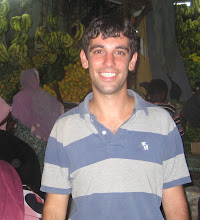September 1, 2006: The “Southeast Asia Blog” Final Note
I’m writing the final note on the Southeast Asia Blog file on my computer from my hotel room in Kampala, Uganda. I feel somewhat bad that the end of this Vietnam blog was constructed so hastily after such a long summer of arduous writings and updates, and I feel that it does not bode well for future blogging that I have written nothing about the huge variety of fascinating experiences in South Africa or my initial several days in Uganda yet. I’m going to work to remedy that now, but in the meantime, I did want to put a few last thoughts in writing.
I didn’t really record anything about our day in Tokyo, though it was an exciting opportunity to see one more epicenter of global commerce, politics, and culture. Scott, Jim, and I made full use of every minute of our eight hour layover in the city visiting a variety of sites ranging from the quiet majestic memorial temple at the center of the city to the Times Square of Tokyo, known as the busiest pedestrian crossing in the world. Though everything wasn’t exactly brand new and gleaming technology as I had fantasized, things did move incredibly efficiently and with well organized and highly advanced infrastructures. Whether it was trains with real-time monitors showing how long to each upcoming station or the automated sticker we received at customs, there was no time lost where a machine could automate human work. (There was, however, a huge shortage of flush toilets—all were squatters—which I found massively annoying in such an advanced city!) The result of such automation, though, seemed to be a city that hummed along in a state of depressing anonymity. Even Japanese machines don’t talk, so there wasn’t anything to add human feeling to what we saw.
We decided that if Tokyo hums than New York buzzes, but Saigon screams. There is always something changing and the streets are packed with people moving at breakneck pace. At the same time, almost everyone you meet on the streets is happy to talk to you, and you are nearly ubiquitously greeted with a warm smile. It is so easy to become a part of the local community. I knew the motorcycle drivers and street vendors and stall owners and coffee shop waitresses and embassy guards and I miss that familiarity that I don’t necessarily feel even in La Crosse anymore. I understand that part of the openness and respect I experienced was because I was white and stuck out. There was more to it than that though. Tourists and backpackers don’t get the same respect—they are more objectified sources of income. When people know that you are living in Vietnam and learning their language and making a commitment to stay awhile, they become really interested in what you do and do whatever they can to help your experience. I love the way that I felt so supported by everyone, from the US Consulate guards who helped teach me new greetings daily to my translator who clipped a newspaper clipping of our group and keeps it on her desk at work.
I hope the attachment I now feel for Saigon will develop for Uganda and other places where I spend substantial amounts of time. It’s hard to imagine a place more “happening,” where change and development can be so tangibly felt on a daily basis. I miss my roommate and our group terribly, but already I am seeing that keeping regular contact with anyone in Uganda will be extremely difficult. All I can say is that I have high hopes and would conclude any assessment of today’s Vietnam with a message of great hope. It is not a perfect society. There is corruption and graft and inefficiency and stifling political officials and a host of cumbersome restrictions on everything. However, everyone has drive and energy and ambition and a will to succeed. Even in the face of tough challenges from our world’s hegemonic superpowers, it seems like Vietnam will, as always, be able to do more than endure emerging stronger and brighter than every before.


0 Comments:
Post a Comment
<< Home